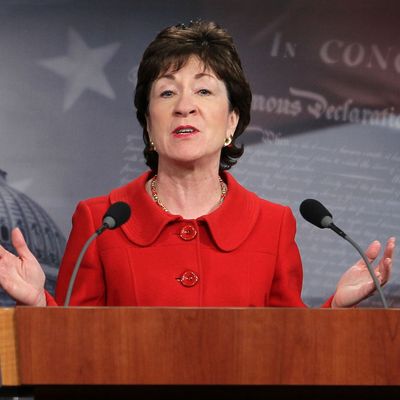
The Republican health-care plan can only afford to lose two votes in the Senate, and with as many as 18 Republican senators expressing reservations about the bill, several GOP lawmakers have warned that it can’t pass without serious modifications. They got some concrete evidence to back up their argument on Thursday night, when Senator Susan Collins of Maine said she’s a firm “no” on the American Health Care Act.
“This is not a bill I could support in its current form,” Collins told the Portland Press Herald. “It really misses the mark.”
Senator Rand Paul has already said he won’t vote for AHCA, and Senators Ted Cruz, Tom Cotton, and Mike Lee have been railing against the bill, though they haven’t said definitively that they won’t support it. They say they oppose the bill because it isn’t conservative enough, arguing that the government’s role in the health-insurance market should be drastically reduced. House Speaker Paul Ryan and the Trump administration have even argued that getting more people covered was never the goal.
Collins’s announcement is particularly significant because she opposes the AHCA from the opposite end of the GOP spectrum. She told the Press Herald that she’d like to see a system that improves Obamacare and gives more people health insurance.
“This bill doesn’t come close to achieving the goal of allowing low-income seniors to purchase health insurance,” Collins said. “We don’t want to in any way sacrifice coverage for people who need it the most.
“Older people living in rural America would be really left behind,” Collins added. Her remarks come one day after President Trump acknowledged during a Fox News interview that the AHCA hits Republican voters the hardest — which, as Jonathan Chait noted, is an attack ad waiting to happen.
While Collins is one of the most moderate Republican senators, many to her right balked at the Congressional Budget Office’s forecast that 24 million people would lose their insurance under the AHCA. Conservatives who oppose the bill on ideological grounds have been most vocal, but the Republicans worried about its effects — who Vox has nicknamed the “Coverage Caucus” — may be an even greater threat:
On the normal ideological spectrum, we’d think of this as a critique of the bill from the left. But interestingly, the Coverage Caucus isn’t just moderate Republicans in swing states or districts who are worried about losing their seats to Democrats (though many of them are represented).
Instead, some of its members, like Sen. Bill Cassidy (R-LA), are conservatives from poorer red states that have greatly benefited from Obamacare’s subsidies and Medicaid expansion. Despite a lack of electoral pressure, they rightly fear that their constituents could be greatly harmed by a poorly designed Obamacare repeal-and-replace effort.
Speaker Ryan shifted his tune this week, acknowledging that the bill won’t pass without significant changes. But it’s hard to imagine any AHCA modification that would bring these two sides together, since their views on the goal of health-care reform are diametrically imposed.
Earlier on Thursday, The Hill reported that many GOP senators now hope the AHCA will die an early death in the House. Collins’s hard no may make that more likely. While some House conservatives are eager to get their opposition to Obamacare on record, many centrist Republican representatives resent that they’re being forced into a controversial vote that stands no chance of passage in the Senate.
“If I hear the Senate say one more time that this bill’s dead on arrival, you know, my head will explode,” moderate representative Charlie Dent told CNN.






























